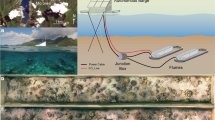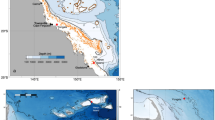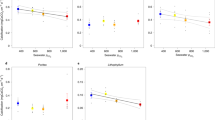Abstract
Concerns have been raised about how coral reefs will be affected by ocean acidification1,2, but projections of future seawater CO2 chemistry have focused solely on changes in the pH and aragonite saturation state (Ωa) of open-ocean surface seawater conditions surrounding coral reefs1,2,3,4 rather than the reef systems themselves. The seawater CO2 chemistry within heterogeneous reef systems can be significantly different from that of the open ocean depending on the residence time, community composition and the main biogeochemical processes occurring on the reef, that is, net ecosystem production (NEP = gross primary production − autotrophic and heterotrophic respiration) and net ecosystem calcification (NEC = gross calcification − gross CaCO3 dissolution), which combined act to modify seawater chemistry5,6,7. On the basis of observations from the Bermuda coral reef, we show that a range of projected biogeochemical responses of coral reef communities to ocean acidification by the end of this century could partially offset changes in seawater pH and Ωa by an average of 12–24% and 15–31%, respectively.
This is a preview of subscription content, access via your institution
Access options
Subscribe to this journal
Receive 12 print issues and online access
$209.00 per year
only $17.42 per issue
Buy this article
- Purchase on Springer Link
- Instant access to full article PDF
Prices may be subject to local taxes which are calculated during checkout





Similar content being viewed by others
References
Kleypas, J. A. et al. Geochemical consequences of increased atmospheric carbon dioxide on coral reefs. Science 284, 118–120 (1999).
Hoegh-Guldberg, O. et al. Coral reefs under rapid climate change and ocean acidification. Science 318, 1737–1742 (2007).
Silverman, J., Lazar, B., Cao, L., Caldeira, K. & Erez, J. Coral reefs may start dissolving when atmospheric CO2 doubles. Geophys. Res. Lett. 36, L05606 (2009).
Friedrich, T. et al. Detecting regional anthropogenic trends in ocean acidification against natural variability. Nature Clim. Change 2, 167–171 (2012).
Suzuki, A. & Kawahata, H. Carbon budget of coral reef systems: An overview of observations in fringing reefs, barrier reefs and atolls in the Indo-Pacific regions. Tellus B 55, 428–44 (2003).
Anthony, K. R. N., Kleypas, J. A. & Gattuso, J-P. Coral reefs modify their seawater carbon chemistry—implications for impacts of ocean acidification. Glob. Change Biol. 17, 3655–3666 (2011).
Kleypas, J. A., Anthony, K. R. N. & Gattuso, J-P. Coral reefs modify their seawater carbon chemistry—case study from a barrier reef (Moorea, French Polynesia). Glob. Change Biol. 17, 3667–3678 (2011).
Orr, J. in Ocean Acidification (eds Gattuso, J-P. & Hansson, L) 41–66 (Oxford Univ. Press, 2011).
Langdon, C. & Atkinson, M. J. Effect of elevated p CO 2 on photosynthesis and calcification of corals and interactions with seasonal change in temperature/irradiance and nutrient enrichment. J. Geophys. Res. 110, C09S07 (2005).
Erez, J., Reynaud, S., Silverman, J., Schneider, K. & Allemand, D. in Coral Reefs: An Ecosystem in Transition (eds Dubinsky, Z. & Stambler, N.) 151–177 (Springer, 2010).
Andersson, A. J. et al. Net loss of CaCO3 from a subtropical calcifying community due to seawater acidification: Mesocosm-scale experimental evidence. Biogeosciences 6, 1811–1823 (2009).
Hughes, T. P., Graham, N. A. J., Jackson, J. B. C., Mumby, P. J. & Steneck, R. S. Rising to the challenge of sustaining coral reef resilience. Trends Ecol. Evol. 25, 633–642 (2010).
Wilkinson, C. Status of Coral Reefs of the World: 2008 (Global Coral Reef Monitoring Network and Reef and Rainforest Research Centre, 2008).
Bates, N. R., Amat, A. & Andersson, A. J. Feedbacks and responses of coral calcification on the Bermuda reef system to seasonal changes in biological processes and ocean acidification. Biogeosciences 7, 2509–2530 (2010).
Venti, A., Kadko, D., Andersson, A. J., Langdon, C. & Bates, N. A multi tracer model approach to estimate reef water residence times. Limnol. Oceanogr. Methods 10, 1078–1095 (2012).
Zeebe, R. E. & Wolf-Gladrow, D. A. CO2 in Seawater—Equilibrium, Kinetics, Isotopes 364 (Elsevier, 2001).
Frankignoulle, M. et al. Carbon fluxes in coral reefs. II. Eularian study of inorganic carbon dynamics and measurements of air–sea CO2 exchange. Mar. Ecol. Prog. Ser. 145, 123–132 (1996).
Lantz, C. A., Atkinson, M. J., Winn, C. W. & Kahng, S. E. Dissolved inorganic carbon and total alkalinity of a Hawaiian fringing reef: Chemical techniques for monitoring the effects of ocean acidification on coral reefs. Coral Reefs http://dx.doi.org/10.1007/s00338-013-1082-5 (2013).
Andersson, A. J. & Gledhill, D. Ocean acidification and coral reefs: Effects on breakdown, dissolution and net ecosystem calcification. Annu. Rev. 5, 321–348 (2013).
Bates, N. R. et al. Detecting anthropogenic carbon dioxide uptake and ocean acidification in the North Atlantic Ocean. Biogeosciences 9, 2509–2522 (2012).
Cantin, N. E., Cohen, A. L., Karnauskas, K. B., Tarrant, A. M. & McCorkle, D. C. Ocean warming slows coral growth in the central Red Sea. Science 329, 322–325 (2010).
Leclercq, N., Gattuso, J-P. & Jaubert, J. Primary production, respiration, and calcification of a coral reef mesocosm under increased CO2 partial pressure. Limnol. Oceanogr. 47, 558–564 (2002).
Silverman, J., Lazar, B. & Erez, J. Effect of aragonite saturation, temperature, and nutrients on the community calcification rate of a coral reef. J. Geophys. Res. 112, C05004 (2007).
Andersson, A., Bates, N. & Mackenzie, F. Dissolution of carbonate sediments under rising pCO2 and ocean acidification: Observations from Devil’s Hole, Bermuda. Aquat. Geochem. 13, 237–64 (2007).
Shaw, E. C., McNeil, B. I. & Tilbrook, B. Impacts of ocean acidification in naturally variable coral reef ecosystems. J. Geophys. Res. 117, C03038 (2012).
Manzello, D. et al. Poorly cemented coral reefs of the eastern tropical Pacific: Possible insights into reef development in a high-CO2 world. Proc. Natl Acad. Sci. USA 105, 10450–10455 (2008).
Fabricius, K. E. et al. Losers and winners in coral reefs acclimatized to elevated carbon dioxide concentrations. Nature Clim. Change 1, 165–169 (2011).
Kleypas, J. A., McManus, J. W. & Menez, L. A. B. Environmental limits to coral reef development: where do we draw the line? Am. Zool. 39, 146–59 (1999).
Gardner, T. A., Côté, I. M., Gill, J. A., Grant, A. & Watkinson, A. R. Long-term region-wide declines in Caribbean corals. Science 301, 958–960 (2003).
Smith, R. S. et al. in Coral Reefs of the United Kingdom Overseas Territories, Coral Reefs of the World 4 (ed. Sheppard, C. R. C.) 173–188 (Springer, 2013).
Dickson, A. G., Sabine, C. L. & Christian, J. R. (eds) Guide to Best Practices for Ocean CO 2 Measurements PICES special publication 3 (IOCCP, 2007).
Mehrbach, C. et al. Measurement of the apparent dissociation constants of carbonic acid in seawater at atmospheric pressure. Limnol. Oceanogr. 18, 897–907 (1973).
Acknowledgements
The authors gratefully acknowledge support from NSF Grants OCE 09-28406 (A.J.A., N.R.B., S.J.d.P.) and OCE 12-55042 (A.J.A.) and NOAA grant NA10AR4310094 (A.J.A., N.R.B.). We thank the MEP laboratory at BIOS, and especially T. Noyes, as well as the BATS laboratory for assisting with monthly collection of seawater samples inshore and offshore. We are also grateful to A. Collins, R. Garley, M. Best, K. Neely, G. Fuentes, M. Humphrey, A. Cevallos and R. Rasse for help with spatial surveys and sample analyses.
Author information
Authors and Affiliations
Contributions
A.J.A. and N.R.B. designed the study. A.J.A. carried out the study, data analyses (with K.L.Y.), model calculations and simulations. All authors contributed to the writing of the manuscript.
Corresponding author
Ethics declarations
Competing interests
The authors declare no competing financial interests.
Rights and permissions
About this article
Cite this article
Andersson, A., Yeakel, K., Bates, N. et al. Partial offsets in ocean acidification from changing coral reef biogeochemistry. Nature Clim Change 4, 56–61 (2014). https://doi.org/10.1038/nclimate2050
Received:
Accepted:
Published:
Issue Date:
DOI: https://doi.org/10.1038/nclimate2050
This article is cited by
-
Global predictions of coral reef dissolution in the Anthropocene
Communications Earth & Environment (2022)
-
Recent ocean acidification trends from boron isotope (δ11B) records of coral: Role of oceanographic processes and anthropogenic CO2 forcing
Journal of Earth System Science (2022)
-
Reef Metabolism Monitoring Methods and Potential Applications for Coral Restoration
Environmental Management (2022)
-
Temporal and Spatial Variabilities of Chemical and Physical Parameters on the Heron Island Coral Reef Platform
Aquatic Geochemistry (2021)
-
Porewater Carbonate Chemistry Dynamics in a Temperate and a Subtropical Seagrass System
Aquatic Geochemistry (2020)



